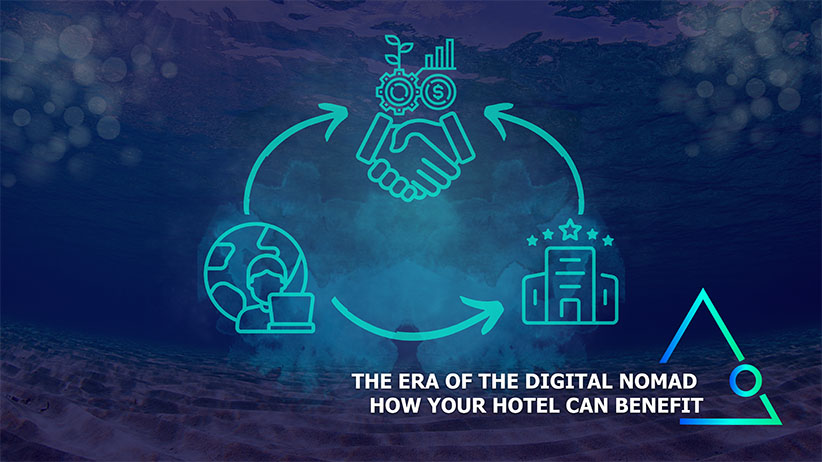
The hospitality industry has been significantly impacted by the COVID-19 pandemic, with many hotels and other hospitality businesses having to close or significantly reduce their operations.
At the same time, the pandemic also led to an increase in remote work, as many companies had to shift to a remote work model to ensure the safety of their employees.
Many digital nomads and other remote workers rely on the hospitality industry to provide a place to stay while working in a particular location. In turn, the hospitality industry can benefit from the business of digital nomads, as they often stay in one place for extended periods.
Hotels can be a convenient accommodation option for digital nomads and remote workers, as they typically have a range of amenities such as Wi-Fi, desks, and comfortable workspaces that make working easier while on the road.
What is a Digital Nomad?
A digital nomad is a person who can work remotely and travels to different places while continuing to do so. Digital nomads typically use technology, such as laptops and smartphones, to stay connected to the internet and work remotely while on the go.
They may work as freelancers, entrepreneurs, or employees of companies that allow remote work. The lifestyle of a digital nomad will enable them to live and work in various locations, often spending short periods in each place before moving on to the next.
Some hotels and other accommodations have even begun to market specifically to digital nomads.
Utilizing Technology to Accommodate Digital Nomads in the Hotel Industry
- Provide high-speed internet: Digital nomads rely on the internet to work and stay connected, so having fast and reliable internet is a must. Hotels can invest in solid Wi-Fi infrastructure and offer multiple connectivity options to ensure guests have a seamless online experience.
- Offer flexible payment options: Digital nomads often need a fixed address, so they may not have a traditional credit card. Hotels can offer alternative payment options, such as PayPal or cryptocurrency, to make it easier for digital nomads to pay for their stay.
- Use technology to streamline check-in and check-out: Digital nomads value convenience and flexibility. Using mobile check-in and check-out options, hotels can make it easier for guests to complete these processes without waiting in line or interacting with staff.
- Create a co-working space: Many digital nomads need a workplace, so hotels can consider setting up a co-working space with desks, printers, and other amenities. This can be especially appealing to solo travelers who may not have a dedicated home office.
- Utilize social media: Digital nomads are often active on social media, so hotels can use platforms like Instagram, Twitter, and Facebook to connect with potential guests and showcase the amenities and services they offer.
Top Technologies to Maximize The Digital Nomad Experience
- Virtual meeting software: This can be used for virtual meetings and video conferencing with remote employees.
- Project management tools: These can be used to assign tasks, track progress, and collaborate with remote team members.
- Time tracking and attendance software: This can be used to track the hours worked by remote employees and ensure that they are paid accurately.
- Communication platforms: These can be used for real-time messaging and chatting with remote team members.
- Online training platforms: These can be used to provide training and development opportunities to remote employees.
- Virtual event software: This can be used to host virtual events, such as team-building activities or company-wide meetings, for remote employees.
Why Should Hotels Consider Catering to Digital Nomads
- Digital nomads are a growing market. As more and more people are working remotely, the number of digital nomads is increasing. This means that there is a growing demand for accommodation that caters to their needs.
- Digital nomads are often willing to pay a premium for suitable accommodation. Many digital nomads are willing to pay a higher price for a hotel that offers amenities such as high-speed internet, co-working spaces, and other facilities suitable for remote work.
- Digital nomads are often travelers who stay for extended periods. This means they can provide a steady revenue stream for a hotel rather than just being a one-off customer.
In Conclusion
Hospitality technology has greatly impacted how digital nomads travel and work. With the proliferation of online booking platforms, it has become easier for digital nomads to find and reserve accommodations in their desired locations.
Additionally, the use of technology in hotels and vacation rentals has improved the overall guest experience, with amenities such as smart locks and virtual assistants becoming more common. As technology advances, it will be interesting to see how it further shapes the way digital nomads travel and work in the hospitality industry.

ExploreTECH Content Team
admin
.png)

